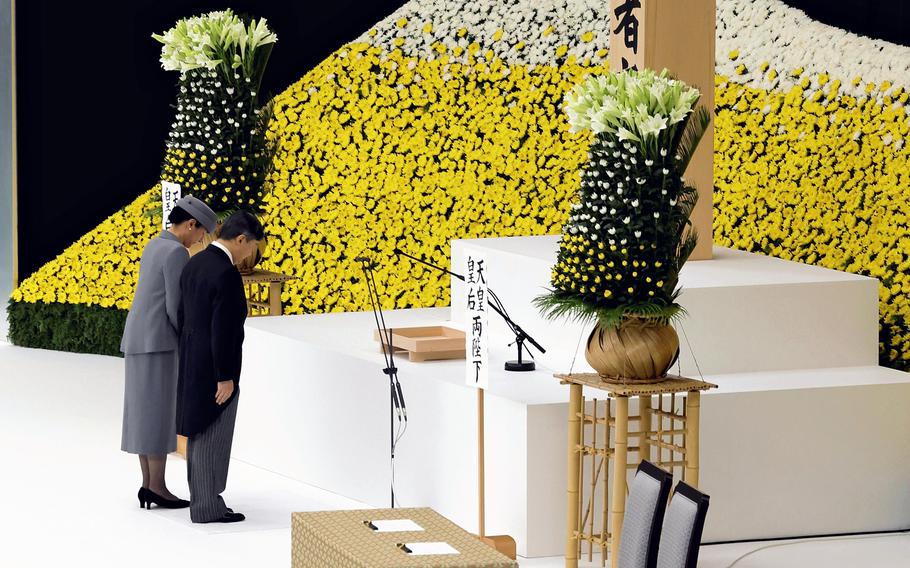
The Emperor and Empress observe a moment of silence at the annual memorial to mourn Japanese who died in World War II, at the Nippon Budokan hall in Tokyo on Tuesday. (Japan News-Yomiuri)
TOKYO — The annual memorial to mourn the about 3.1 million Japanese who died in World War II was held at the Nippon Budokan hall in Tokyo on Tuesday, the 78th anniversary of the end of the war.
Due to Typhoon Lan, relatives of the war dead from 10 prefectures did not attend the ceremony. As a result, there were only 1,600 participants overall.
The memorial service was attended by the Emperor and Empress, the heads of the three branches of government including Prime Minister Fumio Kishida, and members of families of the dead. A moment of silence was observed as the clock struck noon.
It was the first government-sponsored memorial service to be held since the pandemic restrictions. According to the Health, Labor and Welfare Ministry, 2,040 relatives, more than three times the number last year, had been scheduled to attend the ceremony.
However, mainly due to transportation cancellations caused by the approaching typhoon, relatives in the 10 prefectures of Shizuoka, Aichi, Mie, Shiga, Kyoto, Hyogo, Okayama, Hiroshima, Tokushima and Kagawa did not participate. This reduced the number of relatives attending to about 1,400.
The oldest person in attendance was the wife of a man who died in the war, Emiko Takeuchi of Yokohama, 104, while the youngest was a great-grandson of a war casualty: Yuito Ichikawa, 7, a second-grade elementary school student in Akita Prefecture.
There were no parents of someone who died in the war for the 13th consecutive year, and only two wives.
In his speech, the Emperor said: “Reflecting on our past and bearing in mind the feelings of deep remorse, I earnestly hope that the ravages of war will never again be repeated. Together with all our people, I now pay my heartfelt tribute to all those who lost their lives in the war, both on the battlefields and elsewhere, and pray for world peace and for the continuing developments of our country.”
This is the ninth consecutive year, including the Heisei era (1989-2019), that the Imperial speech has referred to “deep remorse” at a memorial service for the war dead.
Prime Minister Kishida said in his address: “We will not forget, even for a moment, that the peace and prosperity that Japan enjoys today was built atop the precious lives and the history of suffering of the war dead ... Japan is determined to join forces with the international community and do its utmost to resolve the various challenges facing the world.”
Wearing masks at the venue was voluntary, and no temperature checks were taken before entry. To prevent infection, the national anthem was not sung, as it had been in previous years, and only the orchestra played.
In response to last year’s fatal shooting of former Prime Minister Shinzo Abe and in light of the later attack on Kishida, baggage checks and body searches using metal detectors were conducted.